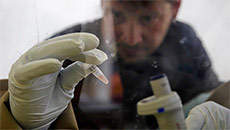An exhaustive hereditary analysis of a large Louisiana family with vision issues has revealed a new gene related to an incurable eye disorder called retinitis pigmentosa.
Retinitis pigmentosa damages the retina and its early symptoms include decreased night vision and peripheral vision and this may end up in blindness.
The retina works like a film as it converts images into electrical signals that can be processed by the brain.
"The story of the hexokinase 1 (HK1) mutation is itself interesting. What we found is a mutation present in families from Louisiana, Canada and Sicily. Our evidence suggests the mutation arose in a common ancestor who lived centuries ago," said Stephen P. Daiger from University of Texas Health Science Center.
With the discovery, the total number of genes associated with this sight-threatening disease has gone up more than 60.
"This information is important because it helps affected families cope with the disorder, helps explain the biologic basis of these diseases and suggests targets for drug treatments and gene therapy," said Daiger.
"Daiger is trying to make a breakthrough in potentially blinding diseases with no known treatments," said Richard S. Ruiz, professor of ophthalmology at University of Texas Health Science Center.
Equipped with the genetic profiles of family members, Daiger's team has identified differences in the genetic makeup of those with the disease.
The researchers also use family histories and DNA tests to glean information about the condition's hereditary nature.
There are different types of retinitis pigmentosa and Daiger's laboratory is focused on the autosomal dominant type.
The study appeared in the journal Investigative Ophthalmology & Visual Science.





